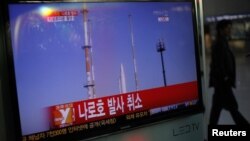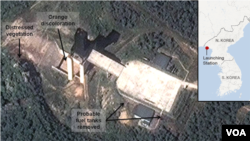An American think tank says North Korea's preparations for a planned rocket launch may have been delayed by heavy snow.
The US-Korea Institute at Johns Hopkins University said Friday that new satellite imagery suggests preparations at the Sohai satellite launch station are proceeding "more slowly than previously reported."
Nick Hansen, an expert on imagery analysis, wrote on the institute's website, 38 North, that images taken on Tuesday showed no tracks in heavy snow at the launch site.
However, Hansen said that, even with weather delays, the North could finish its preparations on schedule.
Standard Missile 3 Interceptors
Patriot Missile Interceptors
Japan said Thursday, it is deploying its missile defense system in anticipation of North Korea's planned rocket launch, which could occur as early as Monday.
Japanese television showed three Aegis destroyers armed with SM-3 missile interceptors reportedly headed for the East China Sea and the Sea of Japan.
Patriot missile interceptors later arrived at Okinawa island, which lies under the missile's projected flight path. Patriot missiles were also positioned behind the defense ministry in Tokyo.
Japan has threatened to shoot down the North Korean missile if it goes off course. It is the same stance the government took last year, before Pyongyang's failed rocket launch.
Pyongyang announced last week that it would launch a rocket between December 10 and 22, supposedly to launch a satellite. Its neighbors and much of the rest of the world have warned against the launch, saying it is really a disguised missile test and banned under U.N. sanctions.
On Wednesday, the U.S., Japanese and South Korean diplomats meeting in Washington agreed to take any North Korean launch to the U.N. Security Council.
The Security Council condemned a failed North Korean launch in April, during which the rocket disintegrated shortly after take-off.
Attempted North Korean rocket launches ended in failure in both 2006 and 2009, although North Korea claimed success.
The US-Korea Institute at Johns Hopkins University said Friday that new satellite imagery suggests preparations at the Sohai satellite launch station are proceeding "more slowly than previously reported."
Nick Hansen, an expert on imagery analysis, wrote on the institute's website, 38 North, that images taken on Tuesday showed no tracks in heavy snow at the launch site.
However, Hansen said that, even with weather delays, the North could finish its preparations on schedule.
Japan's Missile Defenses
Japan's Missile DefensesStandard Missile 3 Interceptors
- Ship launched missile
- Used against short and intermediate range ballistic missiles
- Cost per missile is $6 million to $9 million
Patriot Missile Interceptors
- Launched from land-based mobile launchers
- Used against ballistic missiles, cruise missiles and aircraft
- Cost per missile is $3.5 million
Japanese television showed three Aegis destroyers armed with SM-3 missile interceptors reportedly headed for the East China Sea and the Sea of Japan.
Patriot missile interceptors later arrived at Okinawa island, which lies under the missile's projected flight path. Patriot missiles were also positioned behind the defense ministry in Tokyo.
Japan has threatened to shoot down the North Korean missile if it goes off course. It is the same stance the government took last year, before Pyongyang's failed rocket launch.
Pyongyang announced last week that it would launch a rocket between December 10 and 22, supposedly to launch a satellite. Its neighbors and much of the rest of the world have warned against the launch, saying it is really a disguised missile test and banned under U.N. sanctions.
On Wednesday, the U.S., Japanese and South Korean diplomats meeting in Washington agreed to take any North Korean launch to the U.N. Security Council.
The Security Council condemned a failed North Korean launch in April, during which the rocket disintegrated shortly after take-off.
Attempted North Korean rocket launches ended in failure in both 2006 and 2009, although North Korea claimed success.













